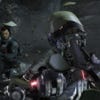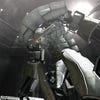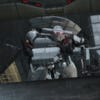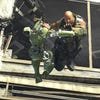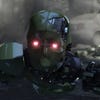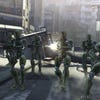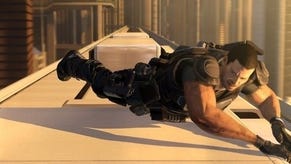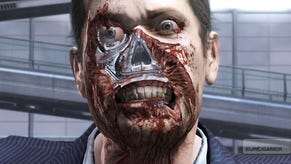Binary Domain Review
Robots in disguise.
Binary Domain is a third-person shooter with a few problems, but everything is forgiven once you start shooting its robots. These enemies are made up like Meccano sets, and though they lack the cutthroat threat of Vanquish's droids, they more make up for it in the details. Their destructible bodies hide endless delights - shoot an arm off, and watch the robot re-align its torso and pick up the gun with the other hand. Shoot off a leg and the robot falls, but quickly balances with one arm and a leg while taking aim. Best of all, shoot off the head and it starts shooting at other robots.
One of the common failings of third-person games is feedback, but the shearing metal and scattering components of Binary Domain's opponents is intensely satisfying - to the degree that you'll often take your sweet time over the last enemy in a fight, chopping off different bits to see what it does. The game even incentivises it, rewarding you with credits the more you damage an opponent before finishing it off, and making that headshot even more key than usual.
The great thing about headshots in Binary Domain is that you need to hit a robot's head several times before it comes off - destroying the initial layers of armour before blowing away the exposed circuits. Hitting three or four shots in a row is difficult, but do it and that robot instantly turns and starts firing at its buddies. During the next few seconds, it's your chance to hit more headshots as the enemy deals with this new threat, meaning that one good headshot can set off a chain of them and destroy huge groups with a few bullets. One little touch especially delights: Binary Domain's smoke effects are excellent, dense and impossible to see through. But robot eyes glow red, brightly enough that they can be seen through smoke. Ready, aim...
As for the bosses, this the best gauntlet a third-person shooter has offered in a long time. Too often, these games have gigantic, awesome-looking bosses that are a drag to fight, Vanquish being the prime example. Binary Domain's line-up has robot versions of animals (a gorilla, a jaguar, an octopus-thing) as well as the mechs you might expect, but the fights are tense and tough affairs where you'll get tossed around like a ragdoll.
Not everything is so great. Though Binary Domain's cover mechanic works well enough, it doesn't have that final level of polish that makes it totally reliable. The same button is used for rolling and slamming into hiding, which means the game has to be perfect at judging context - and it's not.
The weapon set isn't especially inspired either, a grab-bag of assault rifles, SMGs, snipers and shotguns familiar to any fan of the genre. A strange upgrading system sees you finessing the 'main' weapons of hero Dan and his crew at shops scattered around the place, letting you level up a single gun for each person - but it's hard to see the effects of your credit-binges in-game.
Despite this, Binary Domain's campaign is hugely enjoyable. It begins with an underwater infiltration of a futuristic Tokyo and gradually rises through the layers of this weird metropolis, going from café to slum to corporate headquarters. The art direction is outstanding in the upper levels of the city: a Tokyo built by robot labour in precise lines and bright colours, plastered with advertising and stuffed with incidental technology.
There are brief hub sections where Dan can walk around, chat to team-mates and civilians and stock up before heading onwards. These would be fun, and do offer a few laughs, except your walking pace is reduced to a trudge. However, downtime reveals another unusual distinction of the game, for its genre at least; it feels like it's been written by adults, with set-ups and face-offs that have an ease of reference and a ready wit.
This is still future schlock, of course, but compared to the usual scenery-chewing nonsense, it's in a different league. There are a lot of similarities to Sega's Yakuza series (made by the same team), but the cut-scenes here are kept trim, while the power suits and power struggles stay. It is probably the only cover shooter you'll ever play where a scene's climax involves a bureaucrat demanding, "Get me the minister of homeland affairs!"
Even more surprising is how Binary Domain handles its central theme of humanoid robots. The influence of Blade Runner is pronounced indeed, and explicit in several snatches of dialogue straight from the movie, but for once it's not just an aesthetic thing. It would be hard to call Binary Domain profound, but it's also far from the dumb science-fiction tropes we usually see, and it doesn't shy away from the question of what makes something 'alive'. If anything, it's disappointing it doesn't go further with some of its key narrative beats - but best to avoid spoilers here.
The script drops the ball a few times, notably with one of the cheesiest postscripts in video game history and an unintentionally hilarious cut-scene involving a satellite. There are also questionable stereotypes like a beefy black buddy called Big Bo who waddles around saying "a'ight", although elsewhere the game is clever enough to play with its character's own prejudices; Faye, a Chinese woman, is initially called a peasant farm girl by the charming Dan.
So we come to Binary Domain's most curious feature: chatting to your teammates. You play with a headset, which is used during battle for ordering teammates around and between battles to answer questions from your buddies. There's a lot to be said for this, but it has one big problem - the voice recognition isn't quite there.
Most of what you say will be picked up correctly, but at other points, it's a random word game. This wouldn't be too much of a problem, except that what you say influences your teammates - rushing the enemy, you shout "attack!" and on-screen, Dan shouts "Bo!" Big Bo says "what?" You say "attack!" again, Dan shouts "Bo!" again, and Bo says "what?" again. Then you say "oh f**k off" in frustration and, unbelievably, Binary Domain chooses this moment to interpret you accurately. Big Bo gets a downwards-pointing arrow over his head, indicating that he is not impressed.
It works, generally, with the odd lapse. The bigger problem is its implementation, which suggests your speech is having a real impact on proceedings when it's not. Whether your comrades like you or otherwise affects how they respond to orders in battle - they'll either snap into action or growl and ignore you. But there's little wider resonance across Binary Domain's tangled web, with only a couple of divergences in a story which largely plays out regardless of them.
Talking to your buddies is still fun, and even though it's a feature that's been around for a while, Binary Domain shows it's an underused one. A quick word, too, for the way it very occasionally inserts a little clue or revealing line into the middle of a hectic battle; it would be impossible to explain what happens without spoiling these occurrences, but they're super cute.
Binary Domain's campaign rises above its niggles, and it's probably the best the genre has offered since Vanquish. If only the same could be said of the multiplayer. This aspect of the game smacks of back-of-the-box development, losing several of the campaign's most distinctive features and replacing them with a generic online offering you've seen done before, and done better.
The first problem: while feedback from shooting in single-player is superb, here, your human opponents absorb bullets. Secondly, none of the modes are bespoke, just versions of what we've been playing for years - and with no imaginative incorporation of any of Binary Domain's elements. It is so bereft of imagination, while the single-player shows so much, that the whole structure feels like an afterthought.
There is one nice touch: a lack of music. This makes footsteps and other noise a key factor in how you play, which obviously isn't new, but foregrounded to such a degree is fresh. The surround mix is excellent and comes into its own here, with clumsy players obvious a mile away, but it's just not enough to save things. An Invasion mode is also part of the package, which is enjoyable enough but limited to three relatively small arenas that soon repeat themselves.
You wish Sega had followed Platinum's lead and forgotten about multiplayer - and perhaps spent some of that time fine-tuning the campaign. But that is all that's missing. Binary Domain is a game a few degrees short of greatness, an intense and hectic romp that needs that final level of polish to compete with the very best.
Sega is a company cursed by nostalgia, that prevalent and rather cruel notion that they'll never make the amazing games they once did. Binary Domain doesn't quite prove that wrong. But it gets damn close, and does enough to show the future may be bright indeed.


